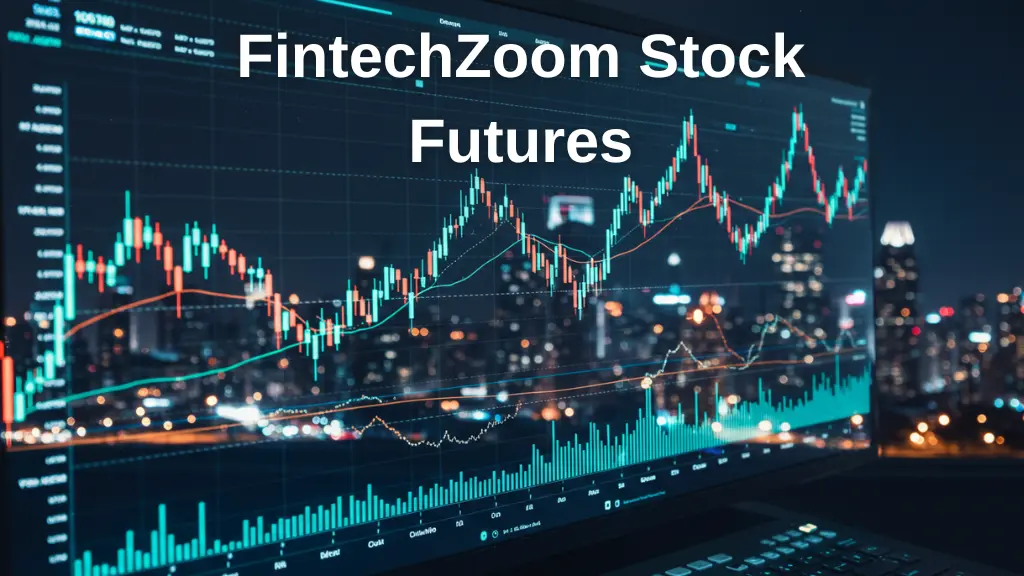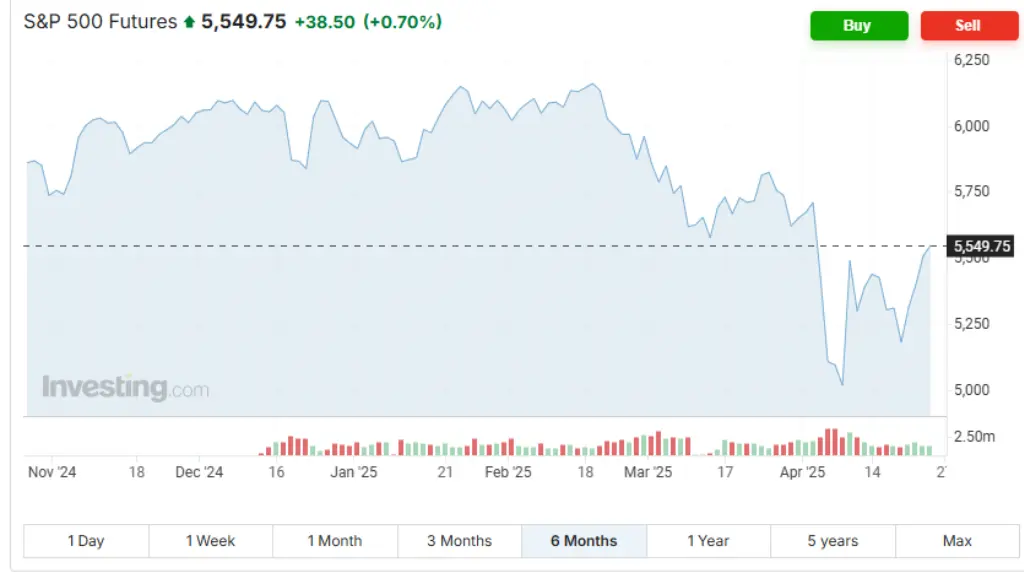FintechZoom Stock Futures Investment Strategies This Year

Stock futures allow investors to lock in a future stock price so they can predict trends and make better decisions. But understanding how stock futures will work is not easy for someone without a finance background. That’s why platforms like FintechZoom stock futures give factual updates on stock futures to help you prepare your next move.
I am here to give you deep insights into my recent analysis of FintechZoom stock futures.
What Are Stock Futures?
Stock futures are contracts that allow investors to buy or sell a certain stock at a predetermined price on a future date. These contracts are used to predict or protect against price fluctuations. Simply put, if you believe a stock’s price will rise, you can buy a futures contract to lock in today’s price.
If you believe it will decline, you can sell a futures contract to lock in a future selling price. This gives an opportunity to investors to manage risk and earn from price changes without actually owning the asset.
The Role of Stock Futures in Investing

Stock futures allow investors to manage risk and perhaps profit from market predictions. From what I’ve seen, many investors use them to safeguard their other investments if prices shift unexpectedly. For example, if you own a stock and believe its price will fall, you can sell a futures contract to mitigate any potential loss.
What you really need is a good analysis to make the right prediction whether the stock will rise or fall. How do you do that? By studying the stock market for hours.
How Stock Futures Affect the Stock Market?
Just like cryptocurrency futures can affect the price movements of digital currencies, stock futures can influence the stock market even before it opens. Stock futures can have a big impact on the stock market, as they influence price movements before the market even opens. From what I’ve seen, futures prices are a key indicator of how stocks can perform during the day.
For example, if futures for a particular stock are trending down, it can signal that the stock will open lower, which can affect investor sentiment and other traders’ decisions. Futures also create market volatility. As so many investors and traders respond to futures contracts, big moves in futures prices can make stock prices jump or fall rapidly.
This is common when news or events are shaping the market, such as economic data or corporate earnings releases. Stock futures influence the actual stock market, affecting how stocks open and trade throughout the day.
6 Effective Strategies for Trading Stock Futures
Alright! Here’s what I have learnt from FintechZoom stock futures, and these are my top strategies for trading:
Hedging
Hedging is a technique used to protect current investments against potential losses by taking a counter position in stock futures. For example, if you are an owner of a company’s stock but believe that the share price will decline, you can sell futures contracts to cover losses. It’s similar to insurance on your investments, providing a cushion when the market goes against you.
Speculation
Speculation is the act of buying or selling stock futures with the aim of making profits from price fluctuations without actually holding the stock. Speculation is used by traders when they anticipate that the price of a stock will rise or fall to make profits out of this fluctuation. Speculation can result in great rewards but holds high risks if the market does not move as anticipated.
Arbitrage
Arbitrage is a strategy in which traders attempt to capitalize on price differences between the futures market and the underlying stock market. If a stock is underpriced in one market and overpriced in another, traders can buy in the lower-priced market and sell in the higher-priced market to secure profits. This tactic requires swift action and close monitoring of price fluctuations across various markets.
Trend Following
Trend following is a technique in which traders buy futures contracts when they think the price of a stock will continue to rise or sell when they anticipate it will continue to decline. Trend following needs patience and good market analysis to find the correct entry and exit points.
Swing Trading
Swing trading is done by holding futures of stocks over a few weeks or days to ride the price movement in the short to medium term. Traders search for “swings” in the marketplace where the price is going to reverse direction only temporarily, and they want to buy low and sell high or sell high and buy low. It is suitable for investors who wish to enjoy price moves in a chosen period without entering into the long term.
Day Trading
Day trading is a short-term technique in which stock futures are bought and sold during the same trading day. The objective is to earn money from small price movements that happen during the day. Day traders must be fast, attentive, and prepared to make quick decisions on current market conditions.
FintechZoom Stock Futures Recent Performance
On April 25, 2025, stock futures experienced a minor drop after a strong rally earlier in the week. Dow Jones futures fell by 0.5%, S&P 500 futures by 0.3%, and Nasdaq 100 futures by 0.4%. Despite the decline, the broader market remains on track for a strong weekly performance, with the S&P 500 up 3.8% and the Nasdaq Composite up 5.4%.
The market’s recent rally has been driven by optimism about anticipated reductions in US-China trade tensions and good earnings announcements from key tech companies such as Alphabet. However, investors should be cautious since economic data and earnings announcements may cause volatility.

Risks Involved in Trading Stock Futures
Trading stock futures can be profitable, but it comes with several risks that investors need to consider. Most of us don’t think about these risks until it’s too late.
Market Volatility
Stock futures are also highly market-sensitive, and their prices can fluctuate a lot within a short period. Unexpected news, economic developments, or unexpected market situations can lead to price declines or rises. You can end up suffering greatly in a brief period if you are not ready for this volatility.
Leverage Risk
Stock futures involve leverage, which means you’re trading with borrowed funds. Leverage can strengthen gains, but it also amplifies losses if the market does not go in your direction. In certain situations, you can lose more than what you initially invested, which is why leverage is a two-edged sword.
Timing Risk
Stock futures trading requires precise timing, and a wrong move can be costly. If you take a position in or out at the wrong moment, you could end up losing even if your initial prediction of the stock price movement was right. The rapid nature of the market allows for easy timing mistakes, especially for inexperienced traders.
Psychological Stress
Futures trading can be stressful, with great pressure to make fast decisions. Fear of losing money or greed to make the most profit can result in rash decisions. Emotional stress can blur judgment for many traders, leading to bad decisions and higher risk.
Margin Calls
As futures contracts tend to be bought on margin, you are required to have a minimum balance in your account. If the market goes against your position, you will get a margin call, and you will need to add more money to your account to cover your loss. If you fail to respond to the margin call, your position will be closed at a loss.
The Future of Stock Futures and Market Trends
Stock futures appear to have a bright future, with growing use expected as more investors look for strategies to minimize risk and profit from market volatility. As technology advances, trading platforms like FintechZoom enable traders to access real-time data and execute transactions more quickly than ever before.
This is likely to open up more options for both short-term and long-term investors. Market trends are also changing, with a growing interest in sustainable and technological areas. This can influence stock futures, as investors increasingly look to contracts related to green technologies and other new industries.
Conclusion
FintechZoom stock futures help you evade risks and profit from market fluctuations. But never forget the dangers of short-term investing, such as market volatility and leverage. Ultimately, stock futures can prove to be profitable in a successful investment strategy when analyzed with proper knowledge.
FAQs
What Exactly Are Stock Futures?
It is a financial agreement between a buyer and a seller to buy/sell a particular amount of the underlying asset at the agreed-upon price on a specified future date.
Why Buy Futures Instead of Stocks?
It is a financial agreement between a buyer and a seller to buy/sell a particular amount of the underlying asset at the agreed-upon price on a specified future date.
Are ETFs Traded 24 Hours?
Trading in equities and ETFs closes at 4 p.m. ET, but unlike mutual funds, you can continue to trade them after hours.
